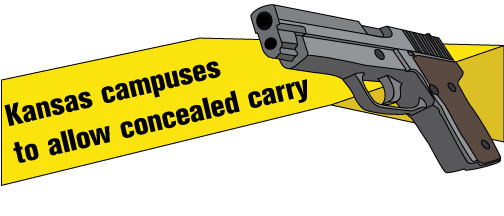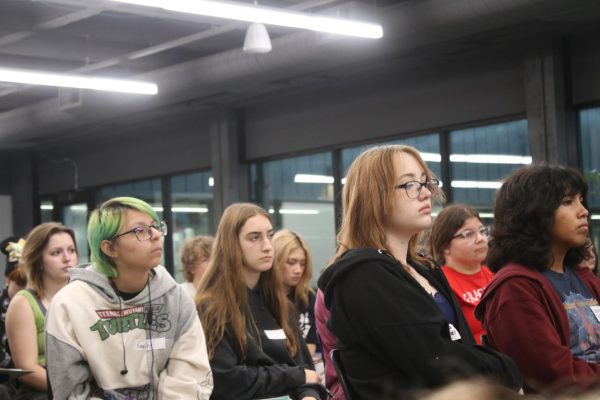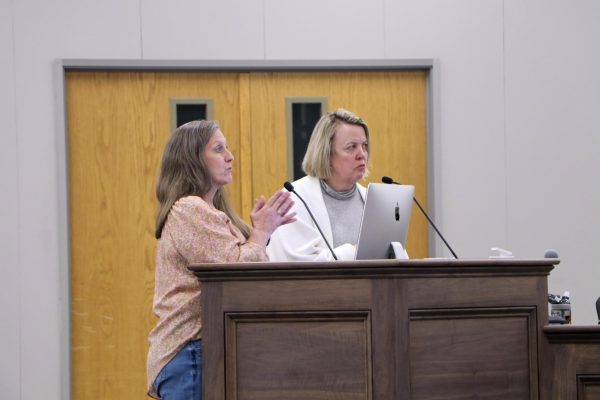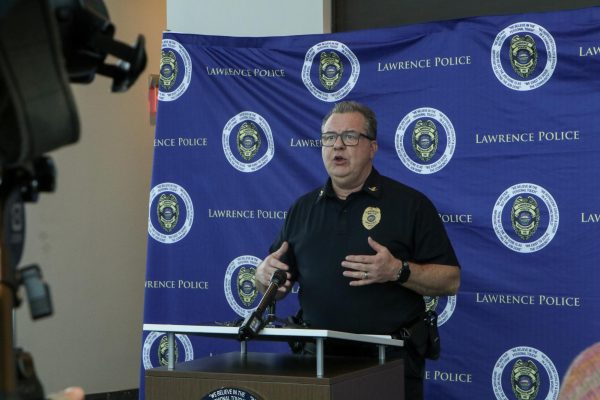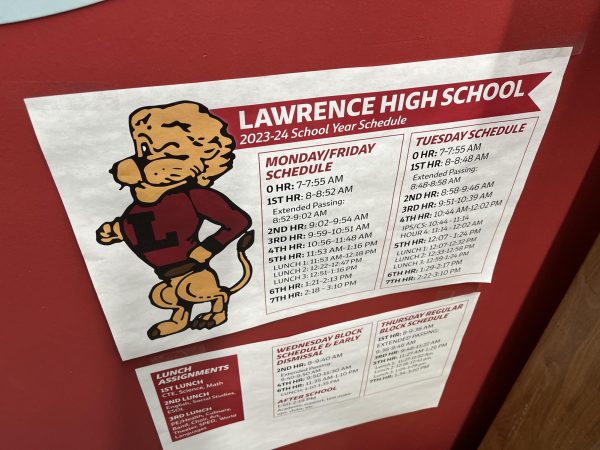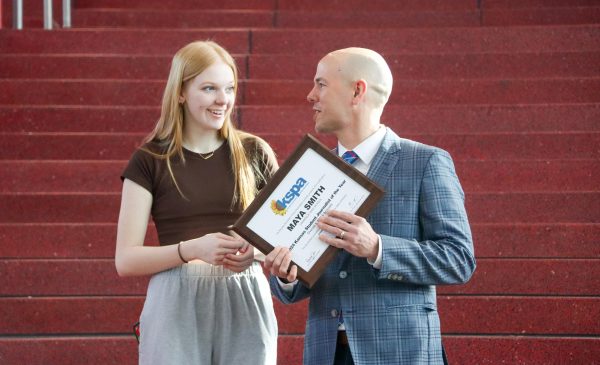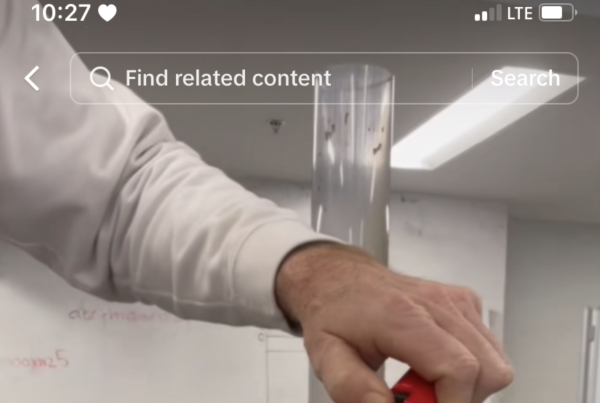Kansas campuses to allow concealed carry
State law exemption expiring in 2017 will permit concealed weapons in college buildings
November 19, 2015
Kansas college students will soon be getting a real-word case study about the Second Amendment.
A 2013 state law allows concealed carry of guns in public buildings. However, when the law was passed universities were granted a four-year exemption to secure their buildings or adjust their weapon policies.
As of July 1, 2017, the exemption will be over and anyone over the age of 21 will be able to carry concealed weapons into campus buildings, including classrooms and residence halls.
Kansas will among five states that allow guns on college campuses, and among six states that allow people to carry weapons without a permit.
“Self protection is not a right that we believe should be checked at the admissions office, as universities do not exist in a bubble but rather in the real world,” said Edwin Stremel, the Kansas state director for Students for Concealed Carry, a national organization devoted to promoting the legalization of concealed carry of guns onto college campuses.
However, despite the fervor of supporters, including in the state legislature, many remain unconvinced gun violence will be solved with more guns on campus.
Senior Gabe Mullen will be attending KU next year, and is concerned about what effects the concealed carry laws will have on campus safety.
“That [campus carry] would certainly make me feel a lot more scared because you never know who is going to use their gun in an irresponsible manner,” he said.
According to The Budget’s survey of last year’s seniors, 62 percent of LHS graduates attended a postsecondary institution in-state. The remaining 38 percent may be subject to similar laws, as campus carry laws are being discussed and passed in state legislatures across the nation.
With the national discussion about loosening gun control laws comes another national concern: school shootings. In 2015 alone, there have been 47 mass shootings on school campuses according to shootingtracker.com.
Those who worry about the change have concerns that go beyond school shootings.
“Most people recognize that if someone who doesn’t really care about their own well-being decides to walk into a classroom and shoot a lot of people there’s not a lot we can really do about that. So in many ways that’s not really what we’re talking about,” said University of Kansas Senate chair and associate journalism professor Michael Williams. “We’re talking about just every day, and the possibility that your attitude, your ability to think what you think, is changed because of the presence of guns.”
To prepare for the 2017 gun laws to take effect, the KU Senate has begun addressing potential issues and brainstorming ways to get the community involved in creating policies. Williams chairs a subcommittee devoted to the issue.
One of the first tasks of the subcommittee, Williams said, is identifying concerns about allowing concealed weapons into public buildings. Several worries, they found, pertain specifically to the college environment, about everything from classrooms to student life.
The laws will primarily affect classroom buildings and dorms. Having armed students in the classroom is a worry among KU professors, Williams said.
“Professors are very worried that it will have a very negative effect on the ability to discuss controversial things in the classroom to tell other students who disagree with each other and with the professor,” he said. “If you disagree with somebody and that person has a gun you may not be inclined to express yourself or express your own opinion.”
Williams also said that drinking, a common college activity, mixed with weapons could pose serious risks. Dorm walls, he said, would be easily penetrable by a bullet, which could injure someone.
The Senate also recognizes the heightened risk of suicide for stressed-out college students and worries that having guns available could lead to more attempts.
In a study done by the Harvard School of Health, suicides are significantly more likely to be attempted in households with guns.
Despite possible risks, many believe arming student and faculty will make campuses more secure.
“I feel like it’s more safe for everyone,” senior Jeremiah Barbe said. “A lot of things happen on college campuses — anything from rape to unnecessary fighting. People need to be able to protect themselves, and I’m comfortable with it.”
Students For Concealed Carry, a national organization, believes campuses are safer with armed students and professors, and branches of the group at different universities advocate for pro-gun policies in their states.
Stremel founded the organization’s branch during his time at Pittsburg State University and has since advocated at the campus and state level to loosen gun control policies on college campuses.
“We worked on our campus to educate students on the current laws and to dispel common myths and misplaced fears that often surround firearms,” he said. “We also advocated for our cause at the state Capitol in order to counter efforts by various Student Government Associations from across the state who were opposing the legislation with the specious claim that the student bodies they represented opposed campus carry.”
Stremel said most campus shootings have taken place on campuses that prohibit weapons, so colleges should allow people to carry guns to protect themselves.
However, two of the most recent school shootings — both on Oct. 1 at Oregon and Texas community colleges — happened in states that allow guns on their campuses. Williams said that although there were armed students on the campus, they weren’t necessarily prepared to take their weapons out at the time the shooters appeared.
Although the KU campus police denied comment for the story, Williams said they’re concerned about active-shooter situations. The police department completed an active-shooter training on campus last year, but the way they are trained to confront a shooter could result in more than the attacker being hurt.
When called into an active-shooting environment, police are trained to shoot at anyone holding a gun.
So if a student who carried a gun had it pulled out, the police may not know who to target.
“When the police go into a classroom, they don’t know who the bad guy is,” Williams said.
The only way for universities to keep weapons out of campus buildings would be to secure each entrance. But universities have long said they can’t afford to provide metal detectors or guards at each entrance of their sprawling campuses. However, Williams said for large sporting events, KU is looking at getting temporary metal detectors and paying officers to man them.
A large issue the KU Senate will be confronting is finding a way to make the student body more comfortable seeing guns on campus. If the police are called for a gun sighting, Williams said, the entire campus is put on lockdown.
The Senate will be putting on educational seminars to help students better assess threat, as well as other gun-related safety lessons.
Universities will also be affected by a state law passed last May that allows concealed carry without a permit. This may cause more concerns in the university setting.
“The fact that people are not getting permits further contributes to this idea that everyone should have a gun,” Mullen said. “I think it also promotes this mistaken view that the Second Amendment was to be taken so literally that we wouldn’t be able to protect ourselves…I think we still need to put in some common sense regulations on who can…carry around a gun. I think that permits are an important step in that.”
For now, guns are largely off limits in elementary, middle and high schools. Although a bill passed in 2013 authorizes school districts to allow their teachers to carry guns in schools, USD 497 has no plans to allow it. It’s unclear if any districts throughout the state have allowed concealed carry by teachers. The Kansas Association of School Boards said it doesn’t collects data about such policies.



